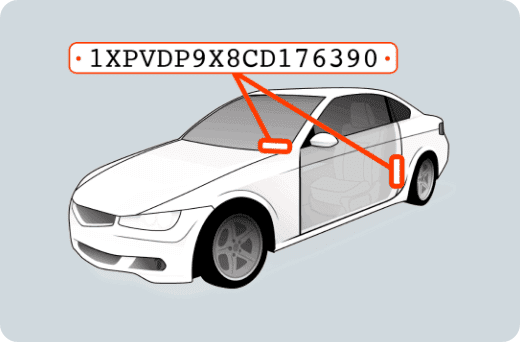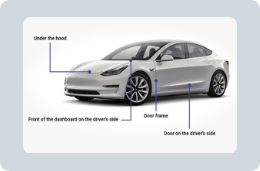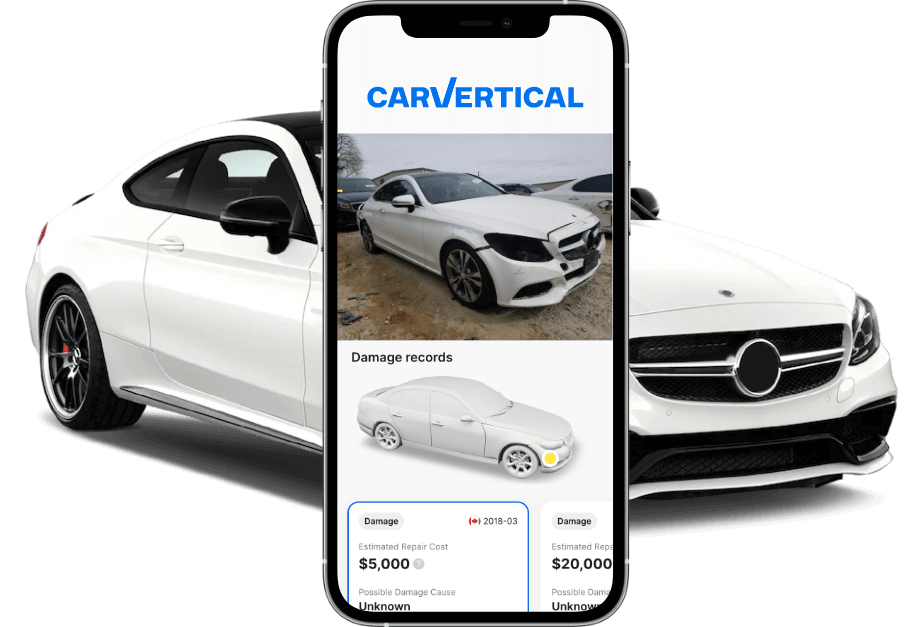australia FREE VIN DECODER and LOOKUP
Enter VIN Number and GET your FREE AUSTRALIA VIN Decoder and Lookup Report.
Everything You Need to Know About VIN Decoders
If you own a car, you may have heard the term VIN when working with insurance or managing any of your details with your mechanic. Every car has a unique number that stores information on the background of the car, which is called the Vehicle Identification Number or, more commonly, the VIN. Your VIN is like a fingerprint unique to one vehicle; every car or road vehicle will have its own VIN assigned.
The VIN is made up of a 17-digit code of letters and numbers and is assigned when the vehicle is manufactured. It can tell you vital information about where your car was made, your engine, transmission, and more. The VIN is vital to help identify your car's history and the specific information to identify the service needed, find the correct parts quickly, and access records. It can be helpful if the manufacturer ever issues a recall or if law enforcement needs to recover stolen vehicles.
When you need to find out more information about your car, this information is not easy to figure out just by looking at the number. Luckily, there are decoders than can help you learn everything you may need to know about your vehicle just by plugging the number in on an online VIN decoder. This guide will walk you through everything you need to know about VIN decoders and the information provided.
What is a VIN Decoder?
A VIN decoder is an online tool where you can enter your vehicle's VIN number to retrieve the specific details on your car easily and quickly. You can access VIN decoders through the internet, and it is available for anyone to have access. You don't have to work in a dealership to pull a vehicle's history.
What does a VIN decoder do?
You can enter your VIN in one of the VIN decoders, and it will provide you with a report including features, where the car was manufactured, engine or transmission type, and can even provide you with a history of the vehicle. The data within every VIN is consistently updated in the database. The VIN decoder will help remove any guesswork when you're trying to get service, buy a car from a private buyer or even a dealership, and help you to understand the features and prevent you from falling victim to fraud.
Where Can I Find the Vehicle's VIN Number location?
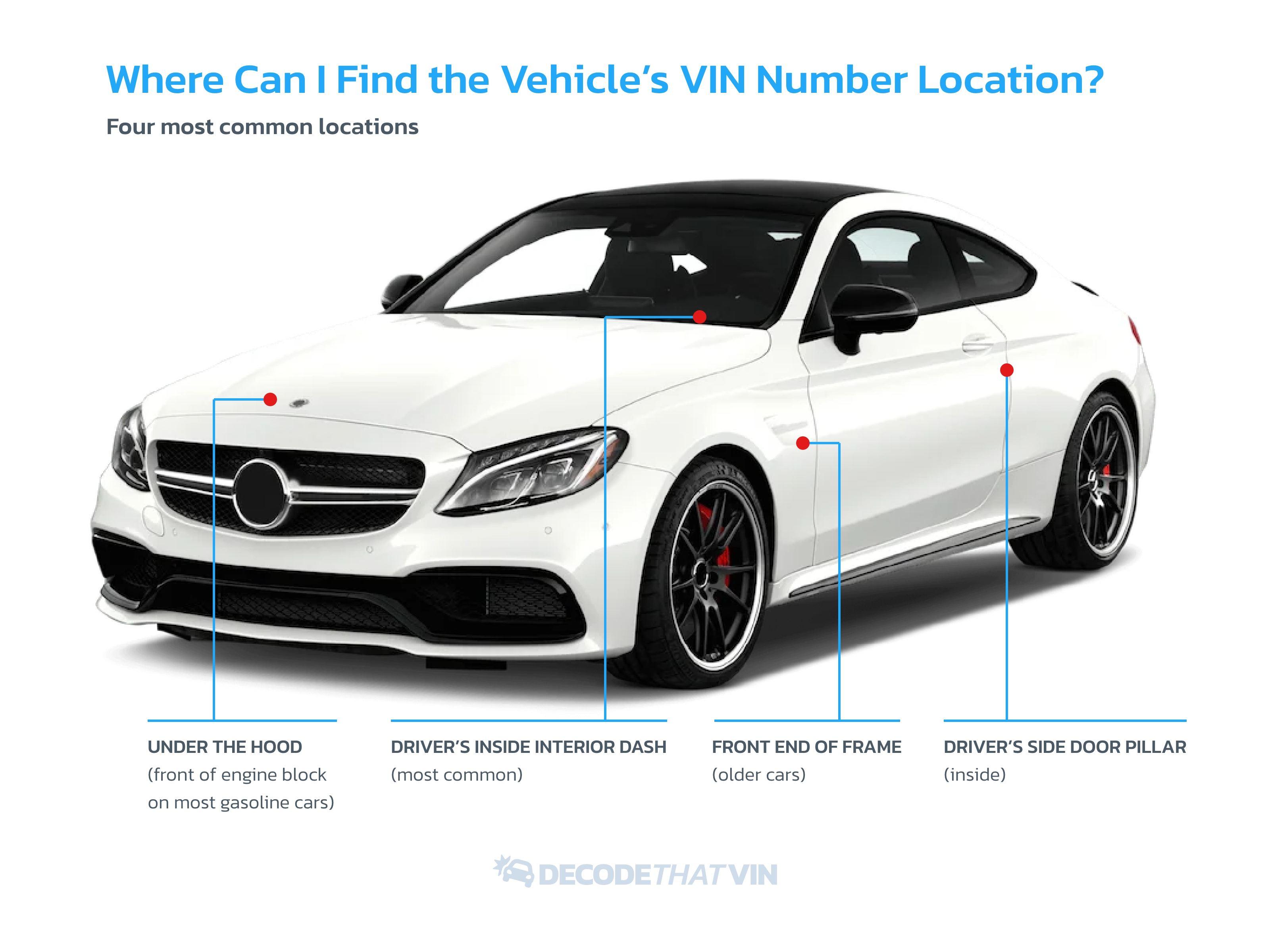
If you need your VIN number, you need to know where to look. On most cars, you can locate the VIN number on the front of the dashboard on the driver's side of the car. You would want to look at it from the outside of the car through the windshield. Many cars also have the VIN number on the driver's side door pillar. You can access the VIN on the side of the door by opening it and finding the information near where the door latches.
If you need to find the VIN on a motorcycle, you can find the VIN below the handlebars, on the motor itself, or on the frame near the motor. For any vehicle, if you can't seem to locate the VIN, you can easily access the VIN on your vehicle title, registration, or on insurance documents and forms.
How to Decode a VIN Number?
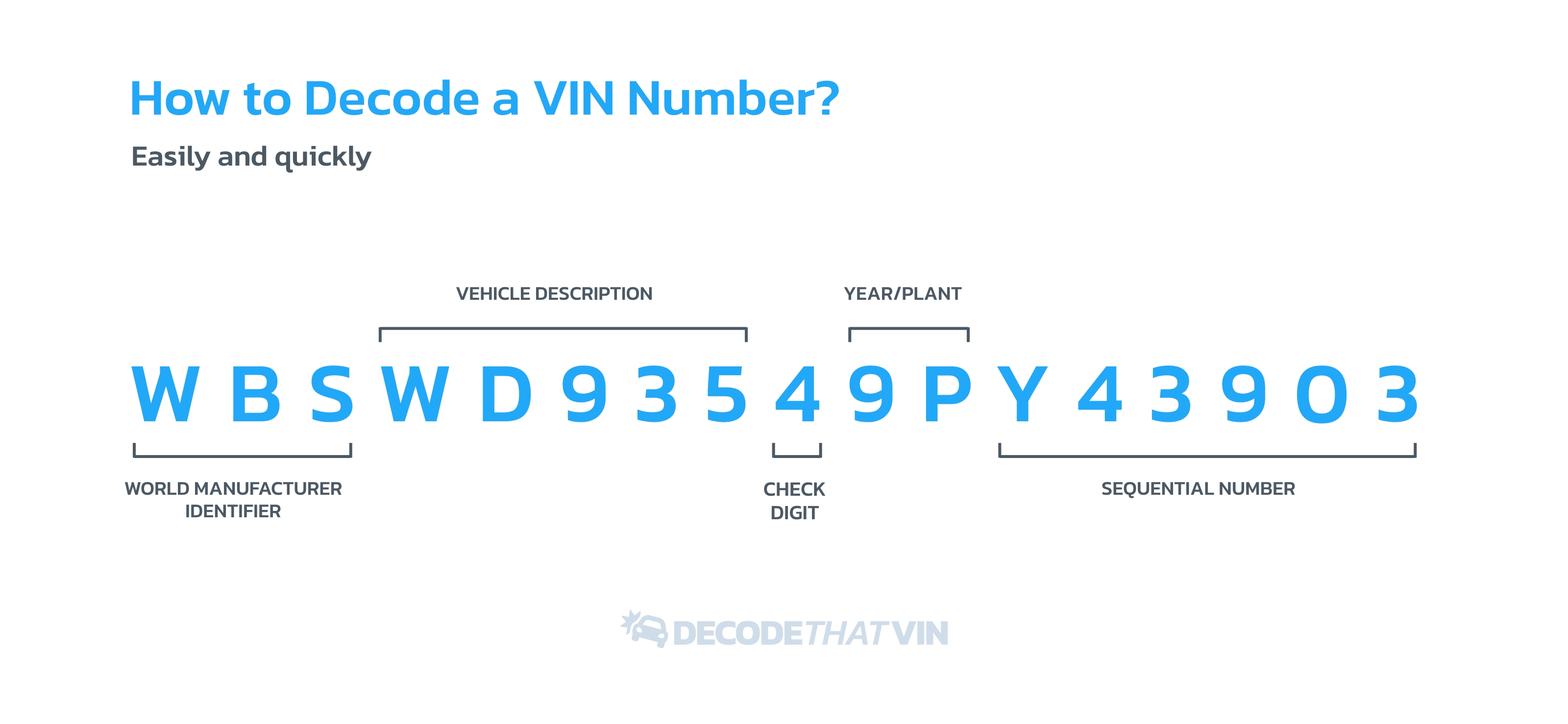
A VIN decoder can help you figure out the information about your vehicle easily and quickly. Once you know what a VIN number is, learning how to read a VIN can come in handy when you need the information and don't have access to an online decoder. The first three numbers help to identify the WMI or World Manufacturer Identifier. The first digit in the VIN indicates the country of origin or where the processing plant is. The second digit specifies the manufacturer, such as a G for General Motors, and the third digit identifies the type of vehicle, whether it's a car or truck.
The next set of digits is 4 through 8, which identifies the vehicle's description. This information will hold the vehicle model, body type, engine, transmission, and restraint type. The ninth digit is more of a control digit to help verify the authenticity of the entire VIN number.
Digits 10 through 17 are the vehicle identifier information. The 10th digit is the model year dating back to 1980, and the 11th digit is the manufacturer's plan code. The remaining digits, 12 through 17, are the numbers the vehicle receives as it moves through production.
What Kind of Information Can You Find By Decoding Your VIN Number?
When you decode your VIN, you will be provided detailed information about your vehicle or a vehicle you are looking into. The information stored in a VIN number includes the make and model of the car, the year it was produced, where it was manufactured, its production number, and features of the car, including engine and transmission type. Decoding your VIN can provide you with accurate, up-to-date details about the car. You can also use the VIN to look up service history and if the vehicle has any accidents that have been reported.
What Is a Car History Check?
Anytime you purchase a car, especially a used car, you should check the car's history before making any major decisions. A car history check or vehicle history report is a collection of records that can provide you with information on the car over the vehicle's life. The vehicle history report can tell you how many owners, any accidents on record if the inspections are up today, and more.
You can better understand any car you may be purchasing from a dealership or even a private owner. The details provided can help you to make decisions as to whether to purchase the car or determine its worth. The details include:
- Number of owners, including length of ownership
- Vehicle service history
- Airbag deployment
- Major accidents
- Structural damages
- If used as a lease, personal, taxi, or police vehicles
- Any mileage rollover
- Recall and warranty information
Why Should I Check the VIN number When Buying a Car?
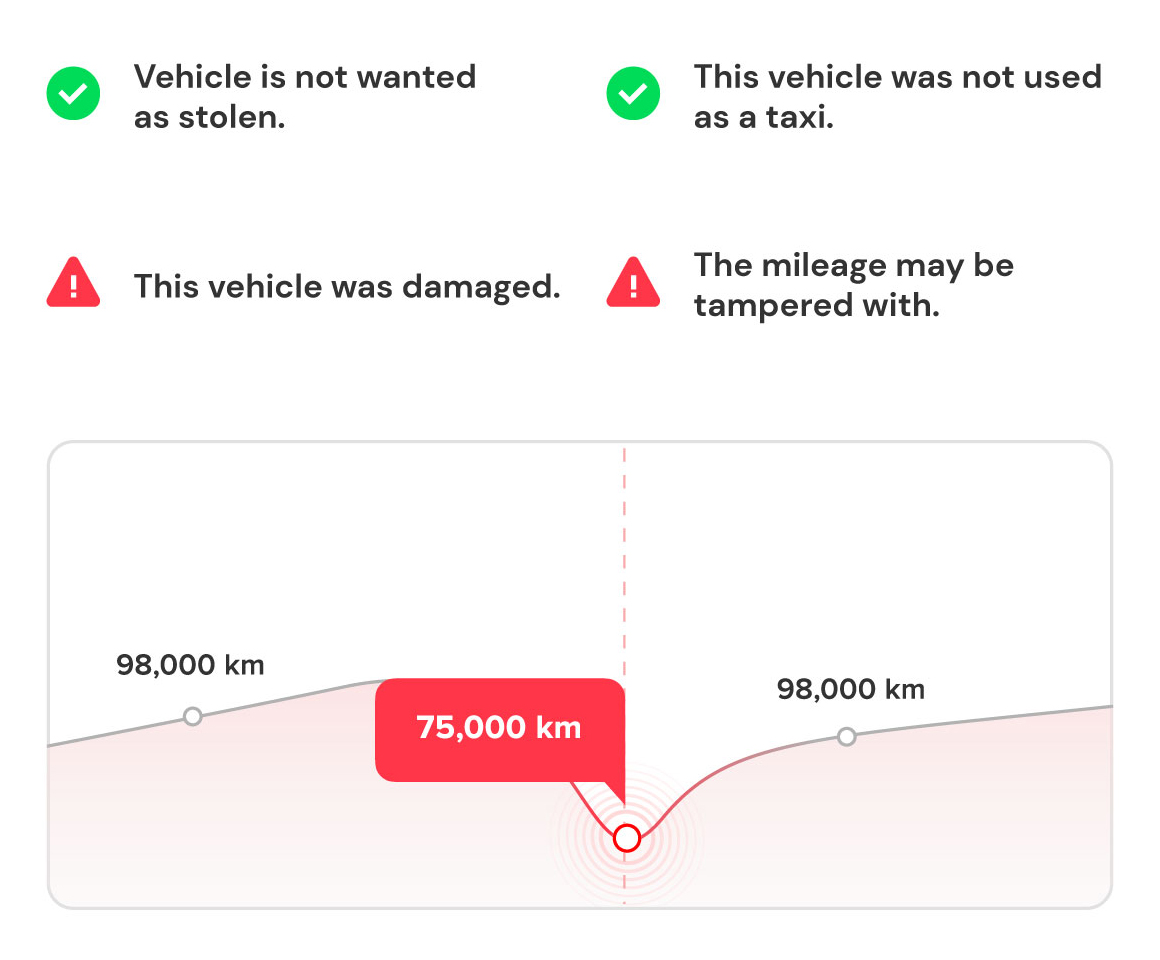
There are a lot of cars in circulation in the world at any given moment. VINs are how we can accurately track the car's history and any important information. Checking the VIN is extremely useful, especially when you are going to purchase a car. It can tell you information that even the current owner may not have provided. Potential buyers can use the VIN to find reliable information on the car's history. Information such as if any recalls by the manufacturer that hasn't been replaced, the history of service, any mileage rollover, how many owners have had the car, if it's been in an accident, and more.
This information can use the VIN to protect you from getting scammed and having to shell out more money on repairs than you expected. It can also help provide information to help determine if the car is worth the money the seller is asking for.
How to Get a Free VIN Check?
Most of the information stored in a VIN is free to access through a number of services. You can get the basic level of information from a single source that will include important user data such as recalls, any safety issues, information about the make, model, engine, transmission, warranty, and more. Free VIN checks can provide you with information about the vehicle's features, such as safety, fuel economy, reviews, and more. You can access this information on carvertical.com.
If you need a more detailed report on the history of your car, such as if the car has ever been stolen or in a major accident, you can visit the National Insurance Crime Bureau and receive up to 5 free VIN checks within 24 hours. The information may not be completely up to date as it's pulled from car insurance companies. It's especially useful if you are shopping for a new car and you're not provided with the car history, and you want to check the reliability of the information you were given.
The only way to get a thorough account of a vehicle's past and full details on the car is to opt for a paid VIN check. The cost can be a worthy investment to get a clear overall picture of anything you may need to know when shopping for a vehicle.
Where Does the Free VIN Decoder Get Information?
The information you can pull from a free VIN decoder is pulled from various sources. After the vehicle is manufactured, the data is sent to the National Highway Traffic Safety Association, which houses the data. When a decoder is accessing the records, it primarily gets the information from the traffic safety department. Information can be pulled from articles, reviews, and even insurance companies. If you're using a free VIN decoder, check to see their sources and if they are reputable.
The VIN number of your car can hold a lot of essential information about the make, model, and history. It can help you when you are insuring your vehicle, during recalls, and if you need to process any warranty claims. You should use the VIN to gather information on any car you plan on buying or own vehicles to understand your car's past and what you can expect from service in the future. Running the VIN can be a powerful tool to give you a heads up on any potential problems and peace of mind when you're on the road.
